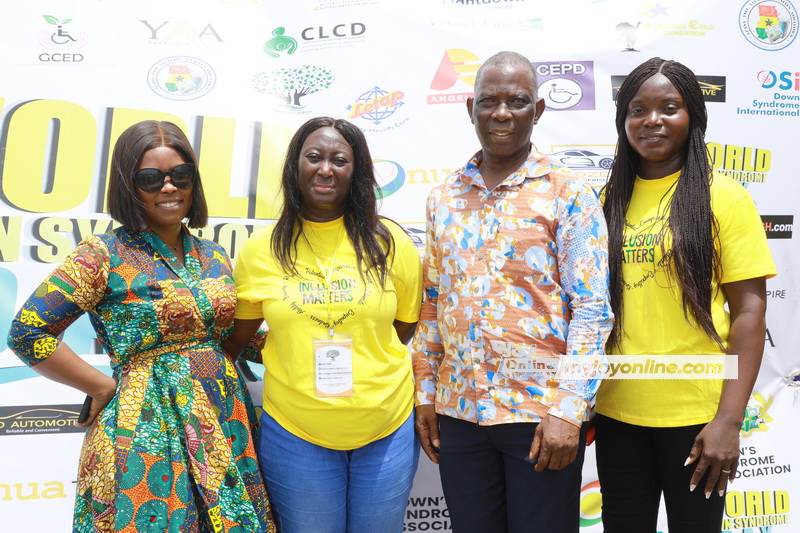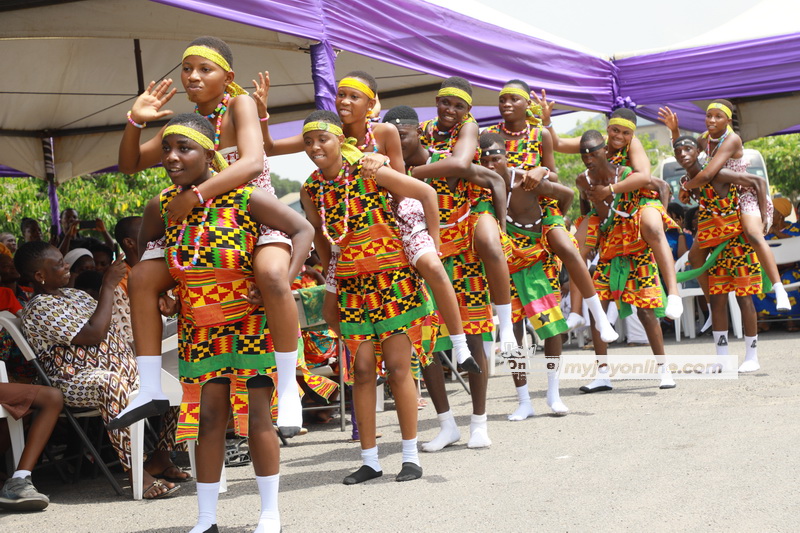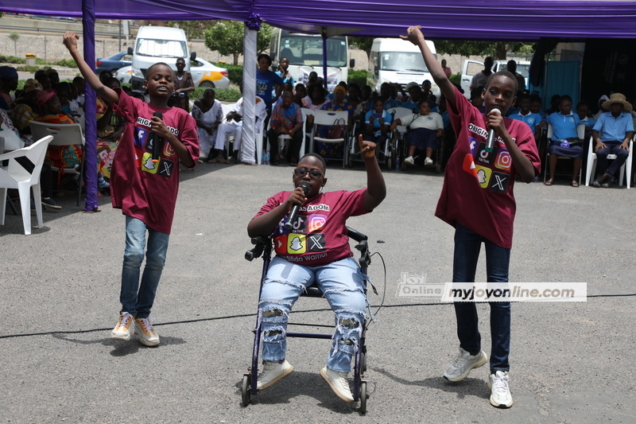Rochelle Boakye Brago (ROBB) Foundation, a local advocacy NGO for people with Down Syndrome on Thursday joined in the global observation of this year’s World Down Syndrome Day at the West Hills Mall in the Ga South Municipality of the Greater Accra Region.
The event, which was held under the theme “End the stereotype”, sought to address the stigmatization people living with Down Syndrome are confronted with.
It brought together health professionals, caregivers, guardians, philanthropists and teachers of special schools.

Alongside the celebration was an exhibition which created an opportunity for special students to display wide range of products and artworks they have done.
Some of the products on display included beads, necklaces, footwear, kente bags and doormats among others.
However, two special art students from the University College of Education, Winneba, Master Samuel Kwesi Akonnor and Master Alfred Gyeni, who exhibited their artistic works, told Myjoyonline that the pain and marginalization they have gone through in the hands of some persons compelled them to use their skills as a medium to communicate their adversities to public.
According to them, they will soon embark on a campaign to create extensive awareness to highlight their capabilities in society.

A band made up students from the Akropong School of Deaf, treated the guests to beautiful music while the cultural troupe entertained them with colorful cultural performances.
In her opening address, the Founder of ROB Foundation, Mavis Opoku Asantewaa, highlighted the importance of World Down Syndrome Day celebration.

Mavis Opoku Asntewaa appealed to governmental and non-governmental organizations, health institutions and individuals involve in healthcare delivery at all levels in Ghana, to develop policies, structures and treatment modalities to ensure equity and also to reduce or eliminate the stereotype in the country’s healthcare delivery system to person’s with disabilities.

Explaining the rational behind the formation of her foundation, Mavis Opoku Asntewaa narrated that it was founded by a group of health professionals after a discussion about down syndrome, adding that those experiences gave birth to the passion and desire to set up an organization to support parents and families who are confronted with the same or similar conditions.
According to her, ROBB Foundation has been at the forefront of Down Syndrome-related activities in Ghana for the past 7 years, providing psychological support, healthcare, education and vocational training to children with Down Syndrome and their caregivers across the country through its regional coordinators.
The organization also organises community outreaches to identify children with Down Syndrome and other children with special needs.
A lot of people with disability have been left out, they have not been recognized” she said.
Ellen Marfo Kyere, an Administrator of the foundation said despite their conditions, children with down syndrome have abilities in some areas, adding that the products on display were done by them.

She disclosed that the foundation is planning to embark on an outreach programme in rural communities to offer children with disability free health screening.
Torching on how to draw a comprehensive programme to promote their works beyond boarders of Ghana, the Administrator said the foundation will start building a database for people living with disabilities to help them come out with a programme for them.
On her part, the National Information Officer at the United Nations Information Center, Cynthia Prah said people must see the imperative dignity and work of every person regardless of their physical or mental abilities.

She expressed worry that too often, people with disabilities including down syndrome are marginalized and excluded from accessing essential and basic healthcare services, adding that the fundamental human rights enshrined in various International treaties and conventions including the United Nation’s Convention on the rights of persons with disability ascertain the rights to help persons with disability to have the same right to the best possible level of help as those without.
Cynthia Prah noted that attaining an inclusive healthcare system requires a healthcare assistance that is accessible to all, and this will involve all relevant stakeholders, government agencies, healthcare providers, civil society organizations among others.
She therefore called for an investment in infrastructure to ensure that healthcare professionals have the knowledge and skills to treat persons with disabilities effectively, efficiently and with respect.

The quality of life of people with down syndrome can be greatly improved by ensuring access to equitable healthcare whether it is physiotherapy, occupational therapy, speech therapy, counseling or special education.
All individuals and children with down syndrome can achieve optimal quality of life through comprehensive healthcare support.
A philanthropist and CEO of Will Engineering and Technical Services Mr Alex Dosu, cautioned communities that perceive children with disabilities as cursed, satanic and therefore subject them to maltreatment, to put a stop to it.
“I want them to stop doing that because those children are souls of God that we need to help and support and develop whatever is in them.”

Mr Dosu, who is a regular visitor to the Dzorwulu Special School said, “special children are very intelligent when they are well taken care of, adding that whatever you want them to do, they do it perfectly and that is why it is important to help them and this shows that their disability is not inability.”

